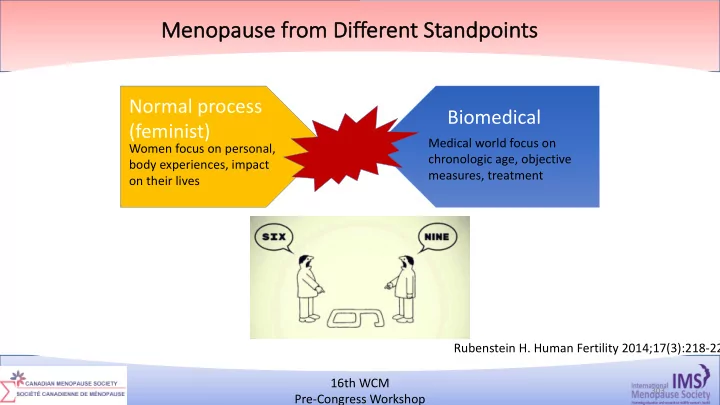

Me Menopause from Di Different t Standpoints ts Normal process Biomedical (feminist) Medical world focus on Women focus on personal, chronologic age, objective body experiences, impact measures, treatment on their lives Rubenstein H. Human Fertility 2014;17(3):218-22 16th WCM 6/4/18 303 303 Pre-Congress Workshop
Menopause from Different Standpoints • Push away from conventional menopause therapies to perceived “alternatives” including compounded BHT • “alternates” promoted as a “hybrid” model – use “natural” therapy for a “natural process”. • The attraction of natural is the misperception that it has less side effects compared to synthetic hormones while providing symptom relief and even anti-aging benefits. • Recent data indicates that ~ 1/3 of women (in US) may be using compounded BHT. Thompson et al. BMC Women's Health 2017;17:97, Fishman et al. Social Scie Med 2015;132:79-87 16th WCM 6/4/18 304 304 Pre-Congress Workshop
Menopause from Different Standpoints Thompson et al, 2017, Qualitative Study on Motivations for Using CBHT Push away from using HT: Pull toward using CBHT: Fear and uncertainty of HT safety Perception that CBHT is safer than Distaste for conjugated estrogens conventional HT Distrust of biomedicine and Effective sx management pharmaceutical industry Desire for individualized treatment Enhanced clinical care Most significant appeal was not the actual CBHT itself but the clinical care associated with it. Thompson et al. BMC Women's Health 2017;17:97, Fishman et al. Social Scie Med 2015;132:79-87 16th WCM 6/4/18 305 305 Pre-Congress Workshop
BHT Risks Presented on Websites (n=100) 100 Breast cancer Proportion of websites (%) Cardiovascular Disease 80 Venous thromboembolism Claims that BHT safer Endometrial than HT = 62%* 60 Side Effects 40 20 0 Number of websites Less risk* Equal risk* Did not compare making claims *Claims of BHT safety as comparison to conventional HT Yuksel et al, Menopause 2017;24(10):1129-35 16th WCM 6/4/18 306 Pre-Congress Workshop
https://further.net/celebrity-science/ 16th WCM 6/4/18 307 307 Pre-Congress Workshop
Factors Associated with Women’s Decisions • Carpenter et al, 2011, Systematic review, n=16 Carpenter et al Maturitas. 2011;70(1):10–15 16th WCM 6/4/18 308 Pre-Congress Workshop
Women’s Perspectives Wo • Studies with women perspectives have shown that women: • Do not feel they have enough information to make informed decisions. 1-2 • Unaware that some symptoms are menopause related. 3 • Safety fears drives women away from making decisions about MHT. 4 • Embarrassed to talk about ”sensitive topics”. 5 1. Parish et al Menopause. 2018;epub. 2. Cumming et al Post Reproduct Health 2015;21:56- 62. 3. Kingsberg et al Sex Med 2017;14:413-424 4. Constantine et al. Post Reproduct Health 2016;22:112-122. 5. Parish et al Int J Womens Health 2013;5:437-447 16th WCM 6/4/18 309 309 Pre-Congress Workshop
Disconnect Between What Women want and What they Get 1. Parish et al Menopause. 2018;ePub 2. Alston et al Discussion Paper, Institute of Medicine; 2012; http://nam.edu/wp-content/uploads/2015/06/evidence. 16th WCM 6/4/18 310 310 Pre-Congress Workshop
Decision Making in Surgical Menopause Theme 3 – Being my own advocate Seeking support from within healthcare system and outside Quality of life Long Seeking term risks Negotiating internet for Being my own of competing info and surgery advocate expectations communal support Health risks with HT Empowering Decision myself and affected by others others Siyam, et al. Menopause 2018;25(7) epub ahead of print 16th WCM 6/4/18 311 Pre-Congress Workshop
What about Health Care Providers? 16th WCM 6/4/18 312 312 Pre-Congress Workshop
Health Care Providers • Implementation and uptake of guidelines in general is poor. • HCP are busy, do not have time to keep up to date with all the guidelines and evidence. • Evidence is confusing for many primary care HCP. How does one decipher through all the numbers? • Medical graduates/residents/other HCP trainees often lack training/core competencies in menopause management. 16th WCM 6/4/18 313 313 Pre-Congress Workshop
What has the evidence shown? • Surveys on physician attitudes regarding (n=19): • Overall positive leaning towards MHT in studies • Clear attitude differences in prescribing MHT between gynecologists/specialists and primary care physicians. “differing advice that physicians provide to their patients contributes to the state-of-the-science gap in HT usage” Chew F et al Plos One . 2017;12(2):e0171189 16th WCM 6/4/18 314 314 Pre-Congress Workshop
Provider Attributes with MHT Prescribing • MHT prescribing has also been associated with: 1-3 • Greater knowledge of MHT trial results • AND confidence in the trial findings • Opinion if the MHT risks had been exaggerated • Preparedness to counsel on MHT • Older providers (vs medical residents) – especially if trained during a time of more positive MHT beliefs 1. Spangler et al Menopause 2009;16(4):810-16, Burg et al, J Am Board Fam Med 2006;19(2):122-131, 3. Taylor et al Menopause 2016;24(1):27-34 16th WCM 6/4/18 315 315 Pre-Congress Workshop
Provider Perceptions of MHT • Surveys with physicians have shown that confusion and skepticism for MHT trials were common. Expressed frustration for 1-4 • Lack of applicability of results to younger women • Exaggeration of risks by media • Absence of clear guidelines/treatment algorithms to help in applying data . 1. Williams et al Am J Obstet Gynecol 2005;193:551-556, 2. Taylor et al Menopause 2016;24(1) :27-34, 3. Power et al Menopause 2007;14:20-28, Power et al Menopause 2009;16:500 – 508. 16th WCM 6/4/18 316 316 Pre-Congress Workshop
Conclusion • Similar rates of decline in MHT use worldwide, including in Canada. • Understanding of risk with MHT has evolved dramatically since WHI, but this has not been well translated into practice. • Understanding risk perception in the context of MHT can help design interventions to support women and HCP with decision making. 16th WCM 6/4/18 317 317 Pre-Congress Workshop
Recommend
More recommend